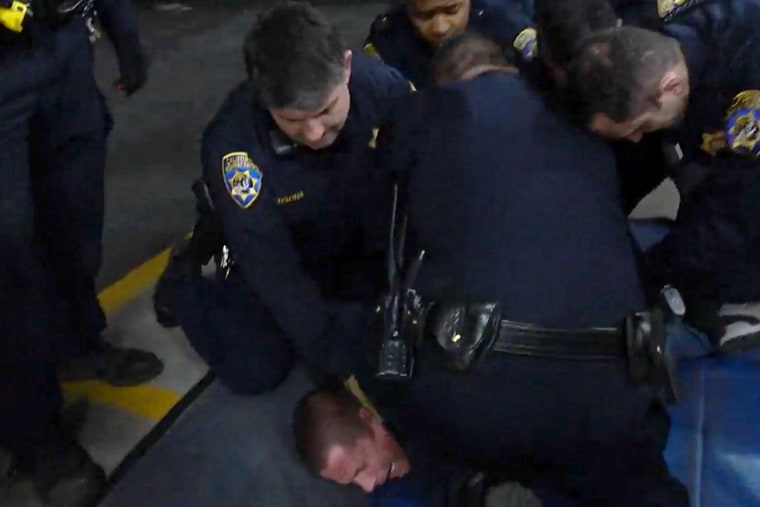LOS ANGELES — The family of a California man suing over his 2020 in-custody death called Tuesday for charges against the officers, and released video showing the man repeating “I can’t breathe.”
Edward Bronstein, 38, died early March 31, 2020, after the California Highway Patrol sought to take a blood sample following a traffic stop for allegedly driving under the influence, according to lawyers for the family and court documents.
The family filed a wrongful-death lawsuit in December 2020, but they also want Los Angeles County District Attorney George Gascón to file criminal charges against the officers.
In video, which was ordered released by a federal judge and shown at a news conference Tuesday, Bronstein is told there’s a court order for a blood draw before five officers hold him down at a CHP garage in Altadena, in the Los Angeles area.

Bronstein, who is handcuffed, is heard asking why they need to draw blood. Officers tell him the draw is a court order and if he doesn’t agree, he will be restrained.
As officers move to restrain him he says “I’ll do it willingly” repeatedly and is told to calm down and “too late,” the video shows. Bronstein screams and says, “I can’t breathe,” repeatedly before falling silent, and the procedure continues.
“Not one officer took the action to pull the others off of him. Pull him to the side, do something to give him air,” the family's attorney Michael Carrillo said. “... When they finally flip him over, he’s lifeless.”
A spokesman for the DA’s office said Tuesday that “the matter remains under review.”
The CHP in Los Angeles declined to comment, citing pending litigation.
The incident in the garage and Bronstein’s death happened around two months before George Floyd died in Minneapolis after a police officer kneeled on his neck, in a murder that evoked widespread outrage.
The video in Bronstein’s case does not clearly show at times where the officers placed their knee in restraining Bronstein, who was facedown while handcuffed.
The Los Angeles County medical examiner’s office ruled Bronstein’s cause of death as “acute methamphetamine intoxication during restraint by law enforcement” and the manner as “unknown,” according to online records and court documents filed by the state opposing the release of the video at this time.
Attorneys for the state had argued against releasing the now-unsealed video because the Los Angeles County DA’s office was still investigating. More recently it asked for a delay pending an appeal, according to court documents.
“My dad was a good person,” Bronstein’s daughter, Brianna Palomino, said Tuesday. “Nobody deserves to die this way.”
In the video shown Tuesday, around two minutes after Bronstein falls silent and unresponsive, officers begin shaking him, one says, “wake up," and they are told to make sure he has a pulse.
Bronstein is left facedown in handcuffs. No officer appears to be on his back, and he appears to take several deep breaths but does not move or speak. When officers sit him up, he does not keep his head up, the video shows.
He does not answer his name, the handcuffs are taken off, he is placed on his back and a device to measure his pulse is put on a finger, the video appears to show.
The person recording says, “Is he breathing? If he’s got a pulse and he’s not breathing, he still needs rescue breaths. Get some air in him.” A mask with a pump is then used and then chest compressions, the video appears to show.
The wrongful death lawsuit alleges that the officers used excessive force and did not pursue medical care in a timely fashion.
Lawyers representing the CHP and the officers in court filings have denied any unconstitutional or other types of wrong conduct, and said they were performing their official duties impartially and fairly.
